
Secrets of the Moscow Kremlin: What Was Hidden Centuries Ago?

© Sputnik/ Grigoriy Sisoev
Spuniknews – August 2016
After restoration work on the Moscow Kremlin’s historical appearance began, archeologists discovered long hidden secrets in the Kremlin’s walls.
Two years ago the decision was made to restore the historic appearance of the Moscow Kremlin. The task was not an easy one, considering the Kremlin’s cultural, historical and political significance.
The Kremlin is a fortified complex that serves as the official residence of the President of the Russian Federation. The existing Kremlin walls and towers were built over the years from 1485 to 1495. The Kremlin area is so large that it accommodates churches, museum areas, and even houses the Presidential military forces.
Building 14, or the Kremlin Presidium
Building 14 or the Kremlin Presidium is an administrative part of the Kremlin; however it never was connected with the Kremlin Palace.

© SPUTNIK/ G. KOSTENKO
In 1958, it was decided to reconstruct it into the Kremlin Theater. But unfortunately, all efforts were dismissed.
Until 1991, in the 1200 seat hall in building 14th sessions of the USSR Supreme Court were held.
In post-perestroika times, the building housed a number of the presidential administration’s departments.
Since late 2015, demolition of Building 14 has been underway and archeologists have found amazing discoveries in its basement.

An archaeologist during excavations at the site of Moscow Kremlin’s demolished Building 14. © SPUTNIK/ EKATERINA CHESNOKOVA
During dismantlement, historical masonry was discovered: two church foundations and the refectory of the Chudov monastery that was destroyed by the Bolsheviks in 1929.
Archeologists began excavations within a 500 sqm area in Building 14’s basements and discovered remnants of early 12-14th century monastic buildings, white stone masonry, terracotta reliefs, and tombstones of the monastery’s necropolis.
Chudov monastery
According to legend, the friary was established in 1365 in memory of the miraculous recovery of the mother of Djanibek, Khan of the Golden Horde, from blindness.
The monastery has a rich history. Patriarch Hermogenes was starved to death in it and in 1812, the headquarters of Napoleon were located inside its walls.

© SPUTNIK/ M. BLINOV
Many great Russian dukes and Orthodox officials are buried on the territory of Chudov monastery.
In 1929, the Chudov monastery was demolished.
The Nicholas Palace
It served as the residence of the emperor and his family.

The Nicholas Palace. © WIKIPEDIA
Architect Kazak built the palace in accordance to the guidance of Kathrine II, for which he received 40,000 rubles.
The Nicholas Palace is famous as the birthplace of the son of Nicholas I, Alexander II, who became the next Russian emperor.
Ascension Convent
If the legends are true, this convent was established by the wife of Dmitry of the Don.
In 1382, the Miraculous Icon of the Mother of God was placed in the monastery.

© SPUTNIK/ View of the Ascension Monastery in the Moscow Kremlin.
The monastery is also famous for being the residence for royal brides and burial place of representatives of Moscow’s princely kind.
Kremlin’s green zone
Today, around the Kremlin, a green zone has been built with an area of 1,6 ha. In it, monastery and church foundations are designated with a globular green fence.

© SPUTNIK/ ALEXEI DRUZHININ A new park is opened on the premises of the Moscow Kremlin on the site of former Building 14.
Restoration of monuments of architecture is planned for the future.
In the meantime, Muscovites and the capital’s visitors have a chance to explore new sightseeing tours on the restored Kremlin territory.
